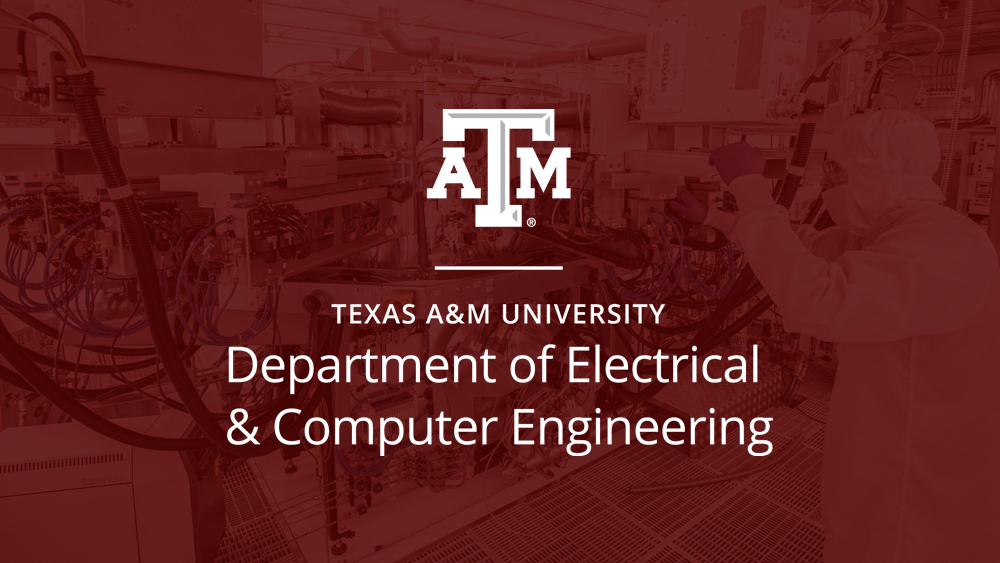
The Department of Electrical and Computer Engineering at Texas A&M University recently hired eight new faculty members with exciting and innovative research interests. The department is also proud to announce the promotion of three esteemed existing faculty members. Please join us in congratulating them.
New Hires
Arya Menon, Assistant Professor
Menon earned a doctorate in electrical and computer engineering from Oregon State University. Her research interests include radars, cognition in radars, radiometers, electromagnetic modeling, high-frequency dielectric characterization, datasets for wireless signals and microwave calibration techniques.
Xin Chen, Assistant Professor
Chen earned a doctorate in electrical engineering from Harvard University. His research interests include scalable learning-assisted control and optimization, distributed algorithms, power and energy systems, human-cyber-physical systems and grid decarbonization.
Sandip Roy, Professor and Director of the Global Cyber Research Institute
Roy earned a doctorate in electrical engineering from the Massachusetts Institute of Technology. His research interests include cyber-physical systems, security and resilience, monitoring and control of infrastructure networks and network dynamics and control.
Roozbeh Jafari, Professor
Jafari earned a doctorate in computer science from the University of California. His research interests include biomedical optics, biosensors, medical devices, digital health and clinical informatics.
Joshua Peeples, Visiting Assistant Professor
Peeples earned a doctorate in electrical and computer engineering from the University of Florida. His research interests include machine learning, deep learning, texture analysis, pattern recognition, computer vision and image processing.
Soaram Kim, Assistant Professor
Kim earned a doctorate in electrical and computer engineering from Clemson University. His research interests include Internet of Things-based remote health and environmental monitoring systems with artificial intelligence and machine learning-based diagnostics; physical, chemical, biological, infrared and multifunctional wearable sensors; biomedical devices and pathogen screening platforms; agricultural monitoring systems; and 3D printed electronics and materials.
Suin Yi, Assistant Professor
Yi earned a doctorate in mechanical engineering from Texas A&M University. His research interests include brain-like computing algorithms and computer architectures, memristor-based application-specific integrated circuits for non-deterministic polynomial time-hard combinatorial optimization, compact modeling of neuromorphic devices, and nano-scale heat and charge transport in thermoelectric devices.
Marco Iskander, Managing Director of Electromagnetic Laboratories and Instructional Assistant Professor
Iskander earned a master’s in electrical and computer engineering from the University of Waterloo. His research interests include tunable filters, characterization of high-frequency circuits and systems and experiential learning.
Promoted
Byung-Jun Yoon, Professor
Yoon earned a doctorate in electrical engineering from the California Institute of Technology. His research interests include genomic signal processing; bioinformatics and systems biology; probabilistic graphical models and algorithms and their application in computational biology; and noncoding RNA prediction and RNA sequence analysis.
Jeyavijayan “JV” Rajendran, Associate Professor with tenure
Rajendran earned a doctorate in electrical engineering from New York University. His research interests include hardware and computer security.
Kate Davis, Associate Professor with tenure
Davis earned a doctorate in electrical engineering with a specialization in power and energy systems from the University of Illinois Urbana-Champaign. Her research interests include the operation and control of power systems; interactions between computer networks and power networks; security-oriented cyber-physical analysis techniques; data-driven and model-based coupled infrastructure analysis and simulation; and cyber-physical situational awareness.